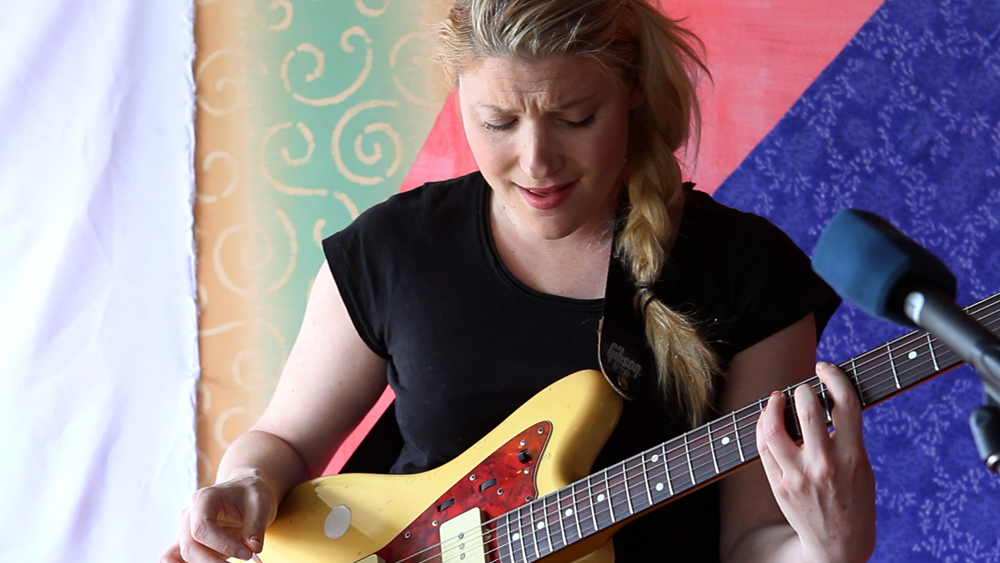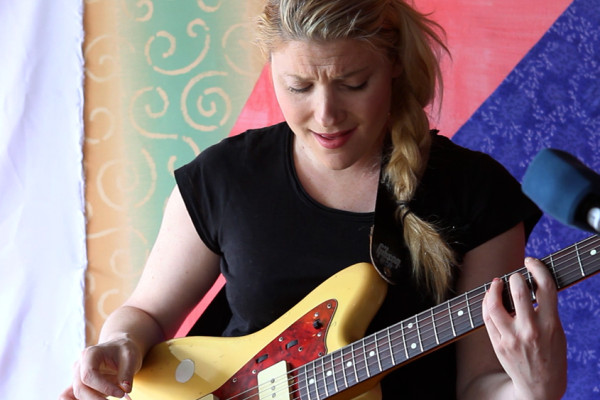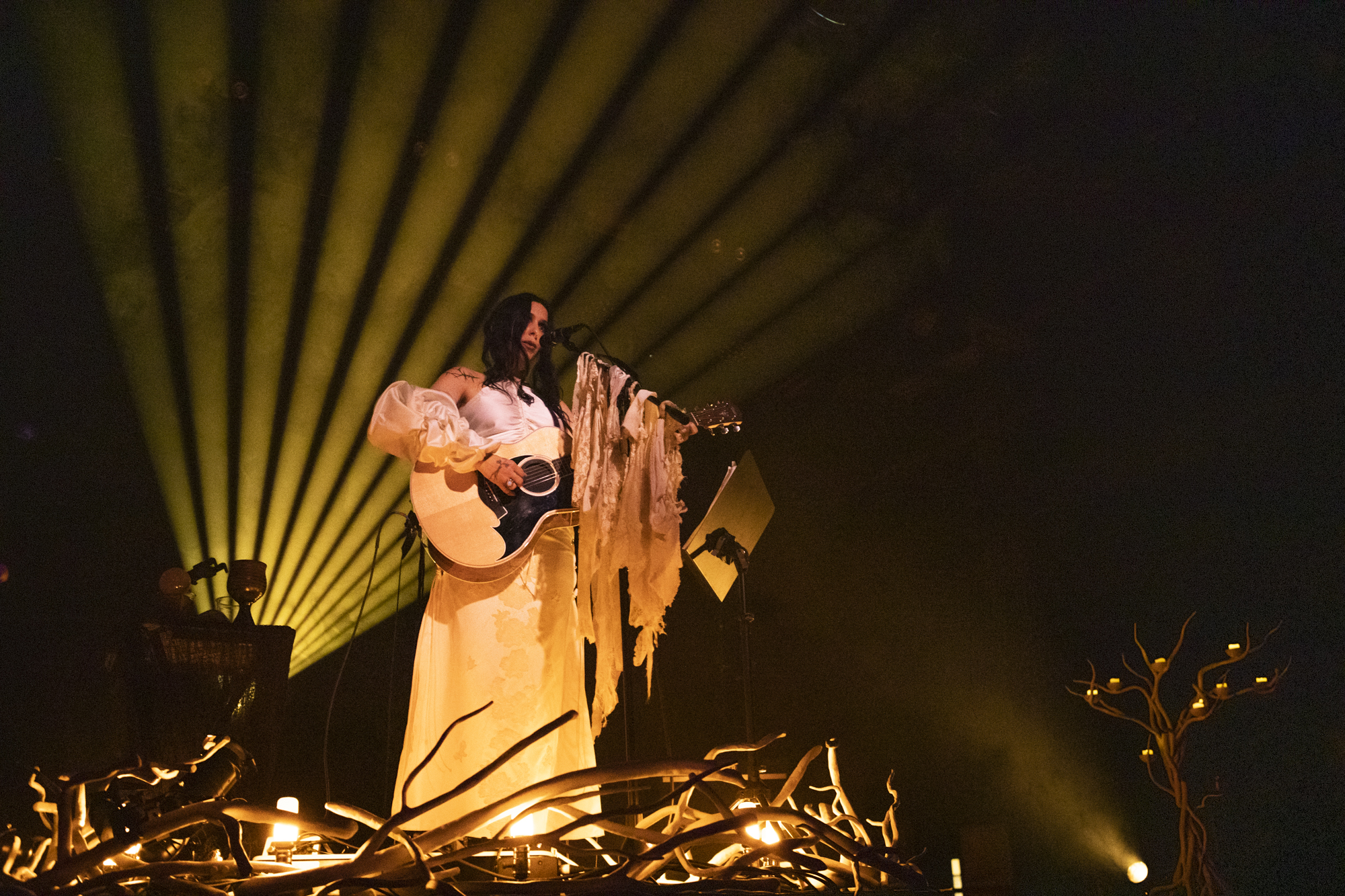
The dexterous, finger-tapping guitarist extraordinaire Marnie Stern gives a glimpse into her colorful Upper East Side apartment in New York City and performs an intense, bare-bones rendition of “You Don’t Turn Down.” This video was created as a pilot for a new project for WNYC’s music program Soundcheck.
———-
Marnie Stern’s Living Room Is A Kaleidoscope Burst Of Color
by Michael Katzif for WNYC Soundcheck
The first thing that catches your eye when we walk into Marnie Stern’s rather spacious Upper East Side apartment is the shocking pink walls. Then, the swaths of patterned contact paper cut into giant geometric shapes. And then, the dark purple night sky ceiling complete with small painted white dots for stars. In fact, everywhere you turn is a bold, so-gaudy-it’s-awesome kaleidoscope burst of color.
For those who know her songs, this brash, colorful room fits with Stern’s musical aesthetic: A glorious mess of dexterous, finger-tapping guitar riffs and energetic melodies, thrashy noise and pummeling drums. Her fiery songs, especially on the superb, and fantastically-titled new album, The Chronicles Of Marnia, can be equally poppy and abrasive — in the best way. And on this sunny, early spring day, as the sunlight poured in through her large windows, those rich pink walls felt warm and inviting.
But, Stern clarifies, this is all pretty new.
The living room was only recently redecorated this way for her music video for her album’s latest single, “Immortals.” The idea for the video, Stern explains, was to turn her apartment into a living, breathing version of the album art from her 2010 self-titled album. That cover — a cute and intricately rendered watercolor painting by Stern’s best friend, artist Bella Foster — provided director Allie Avital Tsypin with the visual spark for the video’s chaotic mayhem and fun.
And knowing that the video’s surreal and hedonistic house show — including a horde of shirtless men, smashed lamps, torn feather pillows, and all — was filmed in this relatively posh upper Manhattan doorman building seems almost rebellious, like they got away with something they shouldn’t have.
In New York City, housing presents its own, let’s say, special set of logistical challenges, especially for someone like Stern who needs a spot conducive to writing, rehearsing, recording, giving guitar lessons, and decompressing after shows — or say, shooting a late night music video — without bugging roommates and neighbors. Or, bothering her dog Fig, for whom she bought a pair of dog earmuffs for hearing-protecting for when they’re on tour.
Stern also says that the neighborhood’s older demographic is calming, and without the pressure of livelier areas in Manhattan and Brooklyn.
“It isn’t trendy or hip at all,” Stern says, “I like that because it helps you focus on what’s important as opposed to your outfit when you go to the store or whatever.”
Still, inside this very “grown-up” building, Stern’s living room comes off both like a secret artist studio and a homey, lived-in space, with its somewhat mismatching flowery furniture, funky lamps and vases.
Oh, and a female mannequin torso, which she uses to stage photos of clothing she sells with her mother on eBay to make money. Stern says she enjoys eBay a lot because the immediacy of selling is gratifying because the results can be more tangible than music.
“With music, it’s all sort of a creative endeavor,” Stern explains, “where you’re making something and then you give it to the world, but you don’t really ever see — at least I don’t ever see any monetary results. With eBay, I take a picture of [an item], I list it, it sells, I get the money, and it’s satisfying.”
It’s always fascinating to get a glimpse into how an artist lives. It’s an opportunity to see not only where they make their art, but peak inside the artistic process. And as Marnie Stern delivered a captivating bare-bones solo performance of “You Don’t Turn Down” in her technicolor living room, it was clear that there’s nothing as satisfying and raw than Stern and her guitar. It was a perfect place to see where her earliest of song ideas first took shape.




